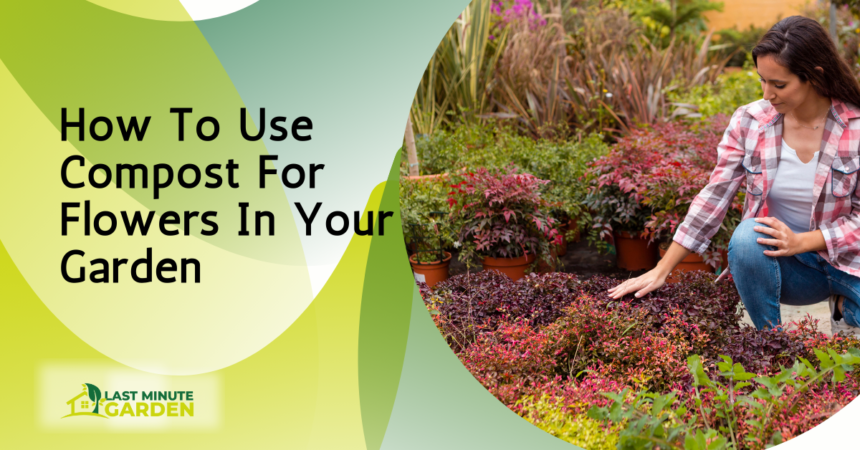Compost can give your flowers the nutrients they need to thrive. Here’s how to use it. If you’re looking to give your flowers a little extra boost, compost is a great way to do it. Compost is full of nutrients that can help your flowers grow strong and healthy.
What Is Compost?

Compost is a type of organic matter that is used as a natural fertilizer for plants. It is made up of decomposed leaves, grass, and other plant materials. Compost can be bought at most garden stores or made at home.
What is The Best Compost for Flowers?
There is no one-size-fits-all answer to the question of what the best compost for flowers is. This is because it depends on the type of flower you are growing and the conditions under which it will be grown. Some people recommend using a high-quality compost made from fresh materials, while others suggest using a mix of fresh and decomposing materials.
Benefits of Using Compost to Fertilize Your Flowers
- Compost is an organic fertilizer that helps to improve the soil quality in your garden.
- Compost is a natural way to add nitrogen and other nutrients to your soil.
- It can help clean up polluted soils. Compost contains beneficial microorganisms that can break down pollutants in the soil. It also adds organic matter to the soil, which helps to bind and filter out pollutants. Compost also increases the soil’s water-holding capacity, allowing it to absorb more of the contaminants that can enter through rain or runoff.
- Compost can be used as a mulch to keep weeds down and cool the soil in summer.
- Compost can be used as a natural pest repellent by either applying it directly to the soil or using it as mulch. Compost helps to create an environment that is inhospitable for pests. The decomposing organic matter acts as a barrier, preventing them from easily accessing the plants and soil.
Compost also helps to attract beneficial insects, like ladybugs and lacewings, which feed on harmful pests. - Compost also helps improve drainage in soil by increasing the amount of organic matter in it. Compost helps to create a better, looser texture that allows water to pass through more easily, reducing the risk of flooding or water-logging.
Compost also helps to increase the water-holding capacity of the soil, which can help plants stay hydrated for longer periods of time during drought conditions. - Compost enables better soil aeration. Compost helps to improve the water-holding capacity of soil, which can help reduce erosion and runoff from heavy rainstorms.
Compost also adds organic matter to the soil, which helps to increase beneficial microorganism activity and improve nutrient availability for plants. The decomposition of compost also produces gases that create tiny channels in the soil that provide better aeration for roots. - Adding compost to soil helps it retain water better by providing pathways for the water to enter and be retained in the soil.
Organic matter acts as a sponge, increasing the capacity of the soil to hold onto moisture and nutrients. This has a positive effect on plant growth and development since plants need an adequate amount of water to thrive. The addition of organic material can also prevent water from running off, which reduces erosion and potential flooding in areas where runoff is a problem.
Organic matter in compost acts as a source of vital nutrients for the soil. It increases the availability of nutrients to the plants, which in turn increases their growth and productivity. Organic matter also helps in retaining moisture in the soil, making it more fertile and productive.

How to Use Compost to Fertilize Your Flowers
Compost is a great way to fertilize your flowers. Simply add a layer of compost to the soil around your plants and water it in well.
Your flowers will love the extra nutrients and you’ll love the fact that you’re using recycled materials to help them grow! In using compost to fertilize your flowers follow the following steps:
1. Spread the compost evenly over the desired area of flowers or vegetable garden.
2. Water the compost and wait for it to dry before continuing with the planting process.
3. Let the flowers or vegetables grow and enjoy their new fertilizer enriched soil!
How to Make Your Own Compost for Flowers
There are a few different ways to make compost for flowers. The most common way is to combine organic matter, such as leaves, straw, and grass clippings, with water in a large container. You can also make compost using a composter.
In this case, you fill the composter with broken down wood chips and other organic material and let it work its magic. Follow the steps below to help make your own compost for flowers:
1. Collect leaves, flowers, and other organic matter from around your property.
2. Place all collected materials in a large, covered container.
3. Add water until the mixture is moistened but not soggy.
4. Turn the compost pile every week or so to help break down the material and distribute the nutrients evenly.
5. Keep an eye on the compost pile to ensure it’s progressing as planned; add more organic matter as needed to maintain proper moisture and temperature levels.
How to Apply Compost to Fertilize Your Flowers
1. Get the compost that is specifically made for flowers.
2. Add the compost to a garden tiller or rototiller.
3. Spread the compost over the surface of the soil.
4. Water the soil and compost mixture well.
5. Keep the soil moist, but not soggy, and fertilize every few weeks with a balanced fertilizer solution.
6. When the flowers are done blooming, pull out the compost and replace with fresh soil.

Conclusion
When it comes to using compost to fertilize your flowers, there are a few things to keep in mind. First, be sure to use a light hand when applying the compost. Too much can overwhelm the roots and lead to problems. Second, water the area well after applying the compost. This will help it to break down and be absorbed by the plant roots. And finally, don’t forget to give your plants a little extra TLC – they’ll be worth it!





